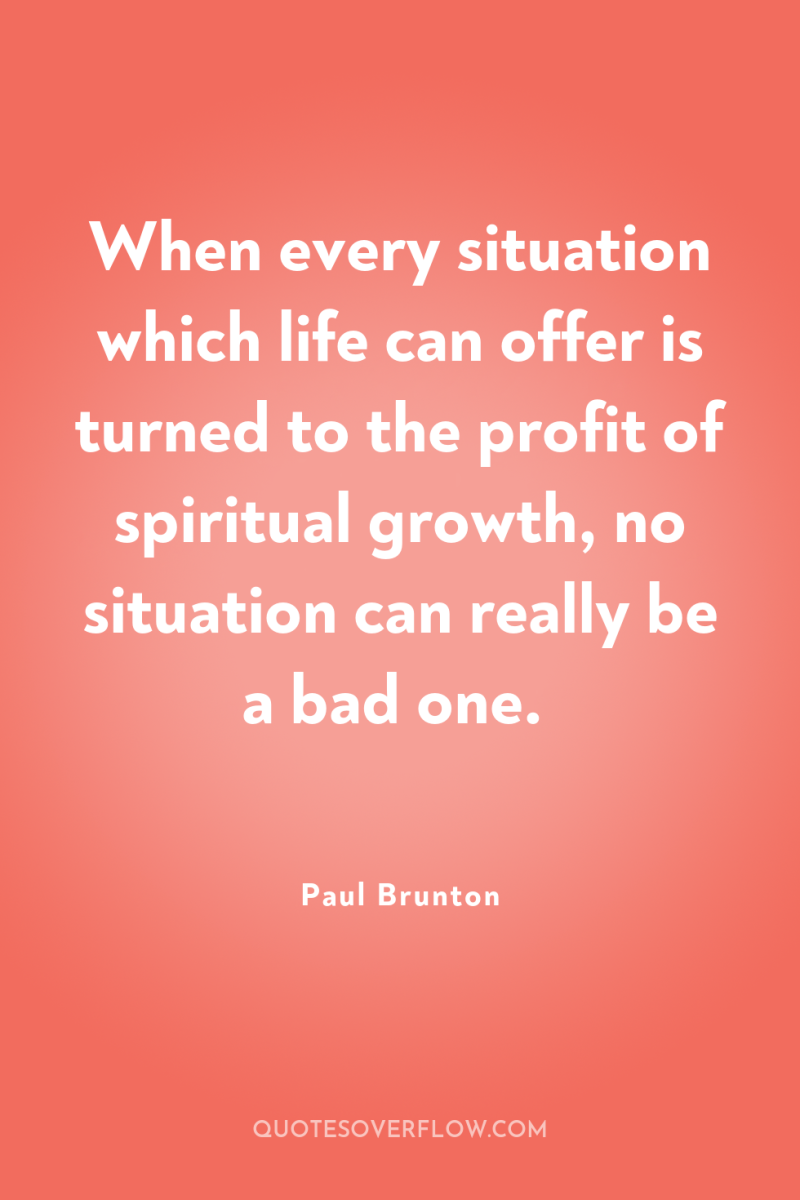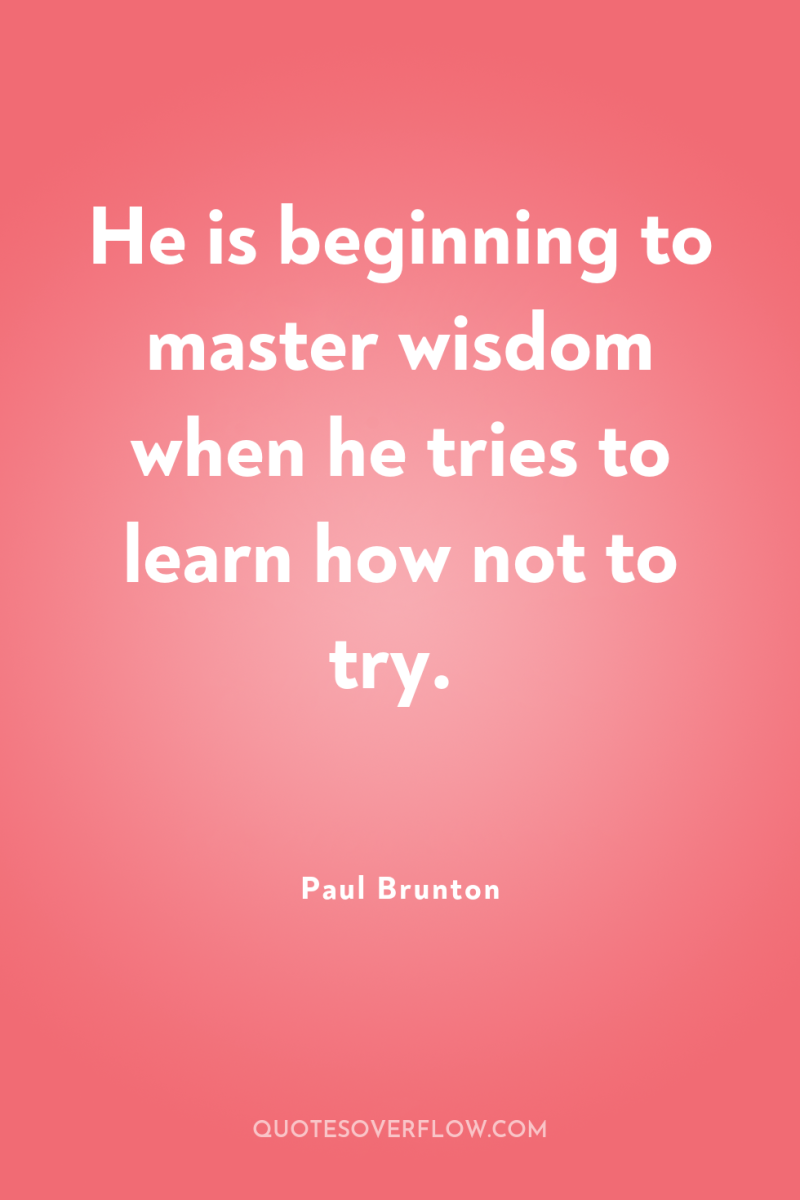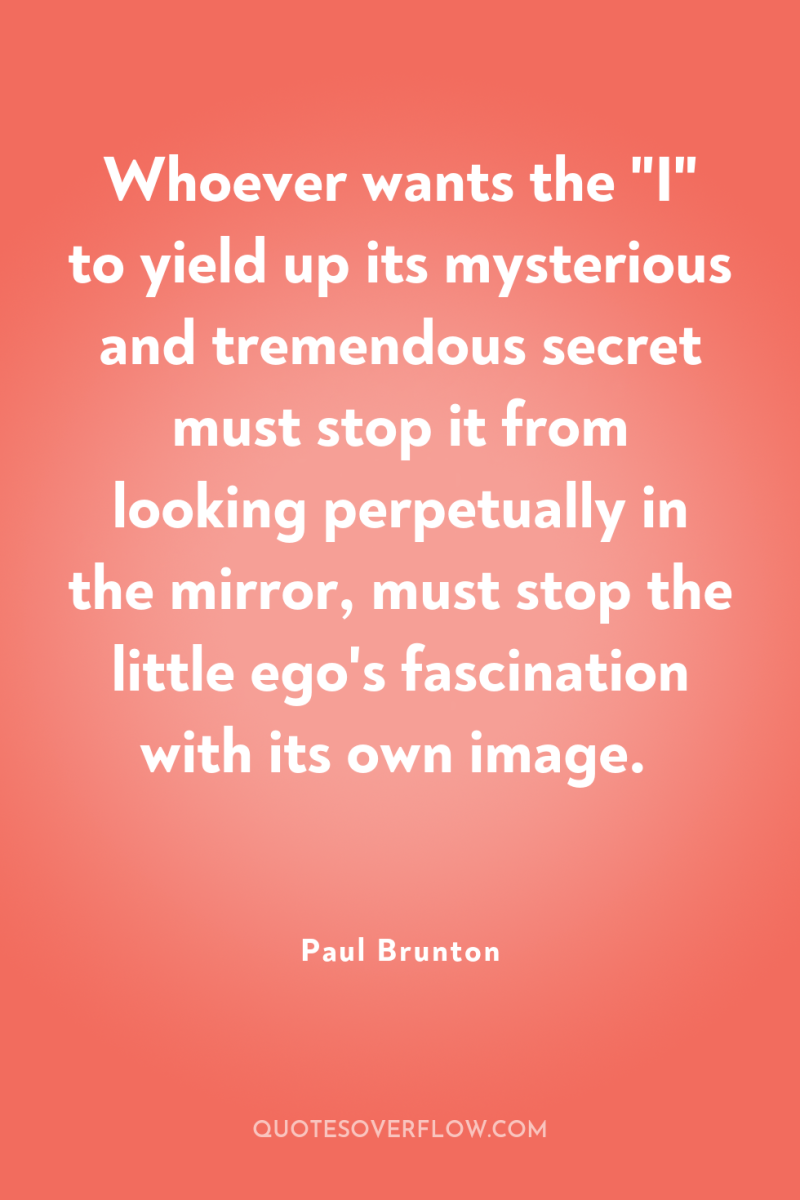1
The philosophic outlook rises above all sectarian controversy. It finds its own position not only by appreciating and synthesizing what is solidly based in the rival sects but also by capping them all with the keystone of nonduality.Paul Brunton
2
Although the pure truth has never been stated, nevertheless it has never been lost. Its existence does not depend upon human statement but upon human sensitivity. In this it is unlike all other knowledge.Paul Brunton

3
When every situation which life can offer is turned to the profit of spiritual growth, no situation can really be a bad one.Paul Brunton

4
He is beginning to master wisdom when he tries to learn how not to try.Paul Brunton

5
Whoever wants the "I" to yield up its mysterious and tremendous secret must stop it from looking perpetually in the mirror, must stop the little ego's fascination with its own image.Paul Brunton
6
The source of wisdom and power, of love and beauty, is within ourselves, but not within our egos. It is within our consciousness. Indeed, its presence provides us with a conscious contrast which enables us to speak of the ego as if it were something different and apart: it is the true Self whereas the ego is only an illusion of the mind.Paul Brunton
7
If you investigate the matter deeply enough and widely enough, you will find that happiness eludes nearly all men despite the fact that they are forever seeking it. The fortunate and successful few are those who have stopped seeking with the ego alone and allow the search to be directed inwardly by the higher self. They alone can find a happiness unblemished by defects or deficiencies, a Supreme Good which is not a further source of pain and sorrow but an endless source of satisfaction and peace.Paul Brunton
8
Let it be stated clearly that mysticism is an a-rational type of experience, and in some degree common to all men. It is an intuitive, self-evident, self-recognized knowledge which comes fitfully to man. It should not be confounded with the instinctive and immediate knowledge possessed by animals and used by them in their adaptations to environment. The average man seldom pays enough attention to his slight mystical experiences to profit or learn from them. Yet his need for them is evidenced by his incessant seeking for the thrills, sensations, uplifts, and so on, which he organizes for himself in so many ways--the religious way being only one of them. In fact, the failure of religion--in the West, at any rate--to teach true mysticism, and its overlaying of the deeply mystic nature of its teachings with a pseudo-rationalism and an unsound historicity may be the root cause for driving people to seek for things greater than they feel their individual selves to be in the many sensation-giving activities in the world today.Paul Brunton
9
Such excessive preoccupation with his faults is not a truly spiritual activity but, on the contrary, a highly egoistic one. The recognition of his own faults should make a man humbler, when it is beneficial, not prouder, which the thought that he ought to have been above these faults makes him.Paul Brunton
10
The ordinary man is aware of his surroundings, first, by naming and labelling them; second, by linking them with past memory of them; and third, by relating them to his own personal self. The illumined egoless man is simply aware of them, without any of these other added activities.Paul Brunton
11
When spiritual seeking becomes too complicated, its exercies too elaborated, its doctrines too esoteric, it becomes also too artificial and the resulting achievements too fabricated. It is the beginners and intermediates who carry this heavy and unnecessary burden, who involve themselves to the point of becoming neurotics.Paul Brunton
12
In the heart's deepest place, where the burden of ego is dropped and the mystery of soul is penetrated, a man finds the consciousness there not different in any way from what all other men may find. The mutuality of the human race is thus revealed as existing only on a plane where its humanness is transcended. This is why all attempts to express it in political and economic terms, no less than the theosophic attempts to form a universal brotherhood, being premature, must be also artificial. This is why they failed. .Paul Brunton
13
That deep silence has a melody of its own, a sweetness unknown amid the harsh discords of the world's sounds.Paul Brunton
14
Now an extraordinary and helpful fact is that by making Mind the object of our attention, not only does the serenity which is its nature begin to well up of its own accord but its steady unchanging character itself helps spontaneously to repel all disturbing thoughts.Paul Brunton
15
(The presence of evil) in his life provokes him into either overcoming it or yielding to it. If the first, it has led him to work for his own improvement; if the second it has led him to acknowledge his own weakness. Sooner or later, the unpleasant consequences of such weakness will lead him to grapple with it, and develop his power of will.. Immediately and directly, it may either strengthen him or weaken him. Ultimately, it can only strengthen him.Paul Brunton
16
If outer events bring him to a position where he can bear them no longer and force him to cry out to the higher power in helplessness for relief, or if inner feelings bring humiliation and recognition of his dependence on that power, this crushing of the ego may open the door to grace.Paul Brunton
17
This withdrawal from the day's turmoil into creative silence is not a luxury, a fad, or a futility. It is a necessity, because it tries to provide the conditions wherein we are able to yield ourselves to intuitive leadings, promptings, warnings, teachings, and counsels and also to the inspiring peace of the soul. It dissolves mental tensions and heals negative emotions.Paul Brunton
18
The mysterious manner in which this growing sense of unity commingles with a sense of utter goodness is worth noting. It arises by no effort of mine; rather does it come to me out of I know not where. Harmony appears gradually and flows through my whole being like music. An infinite tenderness takes possession of me, smoothing away the harsh cynicism which a reiterated experience of human ingratitude and human treachery has driven deeply into my temperament. I feel the fundamental benignity of Nature despite the apparent manifestation of ferocity. Like the sounds of every instrument in an orchestra that is in tune, all things and all people seem to drop into the sweet relationship that subsists within the Great Mother's own heart.Paul Brunton
19
Among the values of meditation is that it carries consciousness down to a deeper level, thus letting man live from his centre, not his surface alone. The result is that the physical sense-reactions do not dominate his outlook wholly, as they do an animal's. Mind begins to rule them. This leads more and more to self-control, self-knowledge, and self-pacification.Paul Brunton
20
The seeker after stillness should be told that the stillness is always there. Indeed it is in every man. But he has to learn, first, to let it in and, second, how to do so. The first beginning of this is to remember. The second is to recognize the inward pull. For the rest, the stillness itself will guide and lead him to itself.Paul Brunton
21
The succession of thoughts appears in time, but the gap between two of them is outside time. The gap itself is normally unobserved. The chance of enlightenment is missed.Paul Brunton
22
Every test successfully met is rewarded by some growth in intuitive knowledge, strengthening of character, or initiation into a higher consciousness.Paul Brunton
23
Accept the long night patiently, quietly, humbly, and resignedly as intended for your true good. It is not a punishment for sin committed but an instrument of annihilating egoism.Paul Brunton
24
Appetite has really become an artificial and abnormal thing, having taken the place of true hunger, which alone is natural. The one is a sign of bondage but the other, of freedom.Paul Brunton
25
Man is more miserable, more restless and unsatisfied than ever before, simply because half his nature--the spiritual--is starving for true food, and the other half--the material--is fed with bad food.Paul Brunton
26
As his mind becomes purer and his emotions come under control, his thoughts become clearer and his instincts truer. As he learns to live more and more in harmony with his higher Self, his body's natural intuition becomes active of itself. The result is that false desires and unnatural instincts which have been imposed upon it by others or by himself will become weaker and weaker and fall away entirely in time. This may happen without any attempt to undergo an elaborate system of self-discipline on his part: yet it will affect his way of living, his diet, his habits. False cravings like the craving for smoking tobacco will vanish of their own accord; false appetites like the appetite for alcoholic liquor or flesh food will likewise vanish; but the more deep-seated the desire, the longer it will take to uproot it--except in the case of some who will hear and answer a heroic call for an abrupt change.Paul Brunton
27
Every discussion which is made from an egoistic standpoint is corrupted from the start and cannot yield an absolutely sure conclusion. The ego puts its own interest first and twists every argument, word, even fact to suit that interest.Paul Brunton
28
It may be considered folly by common opinion but this refusal to destroy life unnecessarily, this reverence for it, must become a deeply implanted part of his ethical standard.Paul Brunton
29
Deep down within the heart there is a stillness which is healing, a trust in the universal laws which is unwavering, and a strength which is rock-like. But because it is so deep we need both patience and perseverance when digging for it.Paul Brunton
30
Solitude is strength to depend on the presence of the crowd is weakness. The man who needs a mob to nerve him is much more alone than he imagines.Paul Brunton
31
Worry is spiritual short sight. Its cure is intelligent faith.Paul Brunton